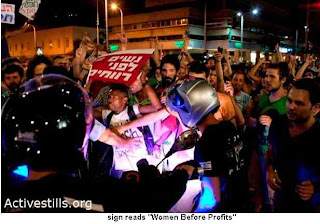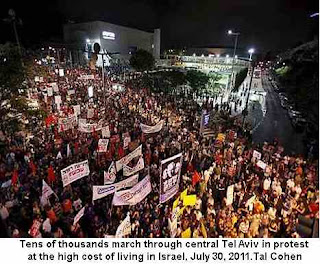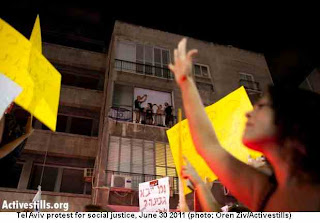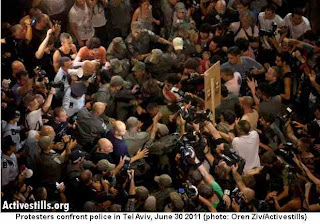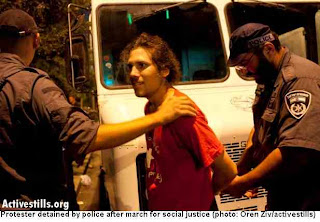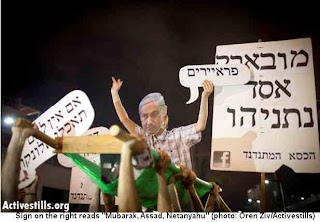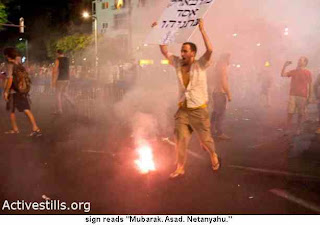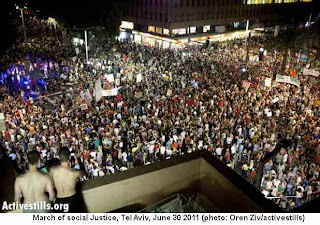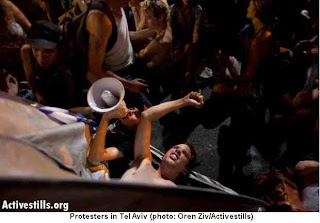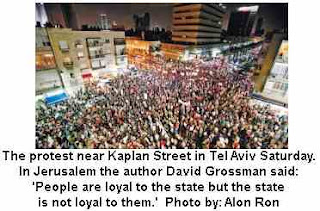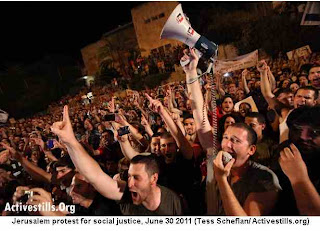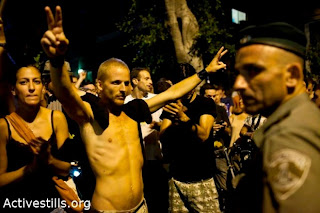Almost unreported in the British press, there have been mass protests in Israel against the housing crisis. Some parts of the Left will undoubtedly see in these protests the harbinger of social revolution. Instead of Zionism, socialism will be ushered in through protests against economic and social conditions.
The problem with this is that these protests are confined primarily to the Jewish sector, with little Arab involvement. The other problem, as is brought out in many of the interviews, is that the Occupation of the Territories is barely mentioned for fear of dividing the social movement. The settlers have established a tent base on the periphery of the movement – physically and metaphorically.
The most remarkable fact of the protests is that they are occurring at all. That in itself is a sign of the deep malaise and also economic problems in the Zionist state. The other remarkable fact is that the Arab Spring has clearly had a marked influence on the Israeli psyche, despite the fact that all we have heard from Israelis throughout the Arab protests was a fear of Muslim fundamentalism and the moan that ‘at least Mubarak brought peace’. It is clear that this Zionist consensus has not been received favourably by all sectors.
And this is important because the stock response from many ‘socialists’ is that we are really in favour of the military conquest of Israel – presumably by all those American lapdog regimes. What this protest tells us is that Israel’s Jewish population, despite itself, is a part of the Middle East not Europe. That a radical and far-reaching Arab revolution would have a very significant resonance inside Israel itself. That we should not imagine that the Israeli Jews will always remain quiescent. Far from there being an Israeli nation, the Jews of Israel are very much a part of the region despite their own desires.
But in their present form, although one of the most significant protest movements among Israeli Jews since 1948, the major protests have been the Black Panthers, the Ashdod and seamen’s strikes of 1951 and 1969, the dockers struggles, the tent protests have not broken with the pattern of protests within the Jewish community that go back to the conflicts between Ben-Gurion and the Gdud-Avodah work brigades in the 1920’s. And this is why, despite its crudity at times, the leaflet of the International Socialist League for the Mass protest in Israel ‘WITH THE ARAB MASSES FOR A SOCIALIST REVOLUTION’ that I reprint at the bottom of these articles is correct when it says that ‘the problem is that most of the Jewish working class in Israel is incapable of joining the struggle against Zionist oppression.
Settler working classes can be very militant. Indeed the Israeli working class has never fought shy of going on strike but significantly Ofer Eini MK, Secretary General of Histadrut has stated that if the aim of the strikes are to remove Netanyahu, then he opposes them. This reveals the utter bankruptcy of Histadrut, faced with that is Israel’s most right-wing government. Eini also reveals the bankruptcy of the Israeli Labour Party or what’s left of it.
This protest is to be welcomed but it would be dangerous to have any illusions in its potential. As long as it is incapable of challenging the State, which under Zionism is an object of awe and reverence, then it will be unable to challenge the fundamental features of Israeli society, not least the domination of Israel’s economy by a handful of ultra-rich families.
Hamas and Fateh are of course incapable of any response, such is the limited nature of their politics. However the Arab masses who have yet to complete their revolutions have a duty to break from the nationalist and chauvinistic rhetoric of the Arab rulers and reach out to their Israeli brothers and sisters to forge an alliance against any repressive regimes.
The Israeli Jewish masses have made it clear that the Arab Spring has indeed given them hope and strength but it has also revealed their weaknesses.
Moshe Machover quotes uncritically from an Israeli journalist who remarks that ‘at long last we have learnt something from the Arabs’. In fact this statement betrays the fundamental weaknesses of this movement. Arabs have always had a great deal to teach Israel’s Jews. Unfortunately they were not listening. This statement is more a sign of the political backwardness of Israel’s protestors and the endemic racism of Israeli society.
But the fact is that possibly the biggest ever Israeli protest movement had to be inspired by the Arabs that Israeli Jews have long despised. That in itself is worth something.
Tony Greenstein
Matan was interviewed by the Junge Welt – an important left wing newspaper in Germany. This is his take on the current scene. RK
Matan Kaminer is an Israeli radical left activist and an MA student in anthropology at Tel Aviv University. He is currently active in organizing the protest encampment at Levinsky (HaKavkazim) Park in Tel Aviv, where native Israelis, migrants and refugees have joined forces. Interviewer: Wladek Flakin, 3 August 2011
JW: Back in March, Israeli Premier said that, in contrast to virtually every other country in the Middle East, there would be no protests in Israel. But last Saturday, up to 150,000 people went out onto the streets demanding social justice, the largest social movement for many years. What is the social background of this movement?
MK: First of all I should say that this explosion was totally, totally unexpected. If you had asked any radical in Israel three weeks ago what the chances were of a gigantic wave of social protest ? you would have gotten laughed at. This is totally unprecedented and unpredicted. That said, in retrospect it’s obvious that the main trigger was the collapse of economic horizons for the younger generation of the middle class. All of a sudden people realized that their woes weren’t a personal failing but a consequence of the system. And then they rebelled. It was only later that the poor and disadvantaged among the Jewish population joined in. And now, the Palestinian minority is making its first steps to join the movement on its own terms.
JW: This protest movement began with a tent city on the Rothschild Avenue in Tel Aviv, very similar to the tent cities at the Puerta del Sol in Madrid or the Midan at-Tahrir in Cairo. Do the young Israeli demonstrators see themselves as part of an international movement?
MK: Yes, definitely. Everybody’s talking about Cairo, and above the assembly area on Rothschild there hangs a large sign saying “Rothschild corner of Tahrir”. In terms of the actual forms of protest and organization I imagine we’re closer to Madrid. One of the most important organizers in Rothschild is Aya Shushan, who spent the previous months in Spain on the plazas. But it’s important to emphasize that in the Israeli context, taking an idea about protest or even revolution from an Arab country isn’t a trivial matter. The solidarity implied here with the peoples of the Middle East is perhaps the most potentially revolutionary aspect of the movement.
JW: In the last year, Israel has experienced a number of important strikes. Are workers participating in this movement, or is it mostly middle-class youth (as many right-wing commentators claim)?
MK: It depends what you mean by workers and middle class. Israel has a post-Fordist service economy. The important strikes in the last year have been initiated by the new, militant trade union federation, Koah LaOvdim (Power to the Workers), and most of its unions are in services from home day care workers to Open University lecturers. The one exception is Haifa Chemicals, a big industrial establishment which is on strike now. From what I hear, the workers there are taking an active part in the movement in Haifa. But “the working class” is not a category that people identify with and act as part of (as opposed to “the middle class” somewhat like in the US). The struggle has not taken up the issue of work relations, with two exceptions: one is a demand to raise the minimum wage. The other is solidarity with public sector workers like doctors and teachers who are perceived as working for the general good.
JW: Ofer Eini, the leader of the largest trade union Histadrut, said on Monday that he would not support the protests if their goal was to bring down the Netenyahu government. On the other hand, many demonstrators took up the chant: “Mubarak, Assad, Netanyahu!” Does the movement aim to bring down the government?
MK: I saw a sign saying that, but I haven’t heard anybody chanting the slogan. The movement is split on the question of whether to call for Netanyahu’s resignation, mainly because people are afraid of being “political”. That may sound bizarre in this context, but in Israel “political” has two connotations that are relevant in this context. One is the idea of being involved in parliamentary wheedling, which is very much out of favor. The other, of course, is taking a stand on issues relating to the Israeli-Palestinian conflict.
JW: One sign at a demonstration read: “Build apartments, not settlements!” Have the protestors been connecting the social question to the question of the occupation of the Palestinian territories?
MK: Making this connection is not as straightforward as the question makes it sound. Of course, on a moral level one can say that “a wrong against one is a wrong against all” and that therefore any demand for “social justice” leads directly to opposing the occupation. But that logic is a bit too abstract. Some Palestinian activists have been voicing concerns that the demands of the protesters will be met at the expense of the Palestinians by more land expropriations for example. In this context it is important to emphasize that if Jewish Israelis were willing to actively participate in the colonization process, in the West Bank as well as in the Negev and Galilee, then there would be no housing problem. Our extreme-right government would be happy to subsidize them. There is an implicit refusal to play that game in the current protest. This refusal is not idealistic or altruistic, but it is nevertheless there.
A whole different dynamic is based in the fear that the government will start a war or a mini-war with one of our neighbors in order to quell the rebellion. It is not out of the question ? Assad, for one, would be happy to play this game with Bibi. A Facebook group called “Committed to continuing the protest even in the case of a military operation set up yesterday already has 561 members, so there is some basis for hoping that the movement might turn anti-war for reasons of self-preservation.
But, these considerations aside, it has to be admitted that for the most part this movement has so far quite consciously kept its distance from the Palestinian issue. This is rapidly becoming untenable and dangerous. Yesterday the head of the Yesha Commission, which represents the settlements in the West Bank, visited the Rothschild encampment and was received cordially. While at first the right tried to isolate the protest by ascribing it to anarchists and left-wingers, the immense support it receives from all sectors of the public (excluding the settlers) has probably convinced them to try and take it over.
JW: What role has the radical, antizionist left in Israel been playing in these protests?
MK: Organizationally speaking, almost none. Prior to the rally in Tel Aviv last Saturday there was an attempt to organize a “radical bloc” which apparently faded away. Exceptions are Koah LaOvdim, which I mentioned above but is not “radical left” though many of its militants are, and Tarabut, a mostly Jewish component of Hadash/al-Jabhah (the mostly Palestinian-Israeli Democratic Front for Peace and Equality).
But as individuals and as a vibrant, well-connected network, the radical left has been amply involved. While some activists dismissed the movement early on, wary of the distance it has kept from the Palestinian issue, most have now jumped on the wagon. Limited as it may be, this is the most exciting thing to have happened here in a generation. I think most of us are busy working the interstices, trying to articulate the causes of the working poor and the Palestinian minority with the struggle, as well as working to build democratic institutions within it. Things are happening of themselves, but we can use our connections and our experience to help them along.
Being a radical left activist in Israel is at most times a pretty depressing proposition. We act not out of belief that we can change anything, but rather out of the moral conviction that we cannot do otherwise. Now, suddenly, everything is open, and our activity can make a huge difference. There is something scary about that, but also something very very exciting. Let’s hope it holds.
AMY GOODMAN: We turn now to Israel, where tens of thousands of people have joined nationwide protests against high costs of living and growing income inequality, setting up more than 40 tent encampments scattered throughout Israel. Yesterday representatives of the 10 camps released an agreement outlining their demands to the government, which include lowering taxes, increasing access to education and housing. Police estimate as many as 120,000 people turned out nationwide to support a movement that’s been picking up momentum in recent weeks. In Jerusalem, some 15,000 people gathered outside the home of Prime Minister Benjamin Netanyahu. Thousands also marched in the capital Tel Aviv.
ZEEV SHALEV: [translated] I am here at the tent camp because I don’t see myself continuing to live in a country that exploits its citizens, doesn’t provide solutions for housing, education, transportation, and basic conditions for its citizens. And I am not moving from here until this situation changes.
AMY GOODMAN: To find out more about what’s happening in Israel, we’re going to Tel Aviv to speak with Dimi Reider, an Israeli journalist, co-editor of 972 Magazine. That’s 972mag.com. He’s been covering the protests. His work appears in Foreign Policy, The Guardian, Ha’aretz, the Jerusalem Post and other publications.
Welcome to Democracy Now! Dimi, describe what is happening and the significance of these protests, and how it relates to the ongoing crises in the Occupied Territories.
DIMI REIDER: Well, I mean, first of all, great to be on the show. I’m a great fan for many years.
What’s happening in Israel is nothing short of revolutionary, not in the sense of necessarily toppling down the regime, but in terms of how people relate to each other, engage with politics, engage with the issues on the agenda. We see—like you mentioned, we see protest camps spreading across the country. We see left-wingers, right-wingers, Palestinian Israelis, Jewish Israelis, ultra-Orthodox, LGBT activists, all coming together to protest against certain issues that they all have a common problem with. The issue of the occupation, however, has been largely missing from the protests, partly as a strategic choice by the organizers.
AMY GOODMAN: And why is that?
DIMI REIDER: Well, I mean, the—it would seem that the idea behind the strategic choice was that it’s probably the most single divisive issue of Israeli society, and if they were to begin protesting against the occupation, they wouldn’t have gathered even a fraction of that support. You know, we’ve been—you know, the Israeli left has been protesting against the occupation for decades, and the numbers of our supporters keep dropping. I think they wanted to reach out to as broad as common—to as broad a common denominator as possible. And for that, at least temporarily, they need to shift the occupation aside.
I mean, other than that, if they would link the socioeconomic issue to the occupation, which—there is, of course, a connection, but if they would link to it in their propaganda and in their protests, they would enter—they would start playing in the field of military and military discourse about security. And it’s a discourse that civil society protesters, especially decentralized young people, can’t win against the government and the military. Now, you know, the occupation is there, and the protesters would have to face it sooner or later, but for now they’re trying to gather momentum by concentrating on the issues that unite them rather than the issues that divide them.
AMY GOODMAN: Can you talk about the significance of these encampments that have been set up?
DIMI REIDER: Well, it’s—you know, as someone who’s been active myself politically for nearly a decade and then covering the political scene as a journalist for quite a few years, it doesn’t resemble anything we’ve seen before. I mean, first of all, it breaks down—it completely excludes all the usual suspects from the game. It excludes the politicians. Most of the politicians have not been welcome guests in the encampments, and politicians from the Likud—politicians from the Likud were largely chased out of the camps, except for one or two who are perceived as being socially responsible and working for this social justice issue. And organized movements, like the [inaudible] organization, were either politely left out or kind of incorporated into the movement without giving them too much clout. So, it’s a decentralized political movement that insists on calling itself apolitical, insists on—insists that it’s nonpartisan. Decisions are made by consensus through popular assemblies. It very much resembles not only things that have been happening in the Arab world, but also the popular assemblies and the popular movement in Spain.
AMY GOODMAN: And what about that? How does what’s happening in Israel relate to these protests of the indignados in Spain, the thousands of people that have turned out throughout Spain, what’s happened in Greece, what’s happened in Egypt?
DIMI REIDER: I think it’s very—well, first of all, Egypt is a huge, huge inspiration for young Israelis here. I mean, we have signs on the main camp in Rothschild calling it Tahrir Corner. We have chants of “Mubarak, Assad, Netanyahu” in the protests. And, you know, generally, while the establishment here is very cautious and very—you know, had a very negative approach to the Egyptian revolution, in fact, as we just learned today, even offering Mubarak political asylum, the younger generation, especially young professionals, were very much inspired by what was happening there.
AMY GOODMAN: Dimi, explain what you just said about offering Mubarak political asylum.
DIMI REIDER: Oh, there was—former minister Benjamin Ben-Eliezer said today that Israel had offered Mubarak political asylum during the revolution, but Mubarak declined because he was a patriot.
AMY GOODMAN: Where does Benjamin Netanyahu, the prime minister of Israel, stand in the opinion polls right now? And there’s a major protest right outside his house.
DIMI REIDER: He doesn’t stand. He’s in freefall. You know, when he came back from his speech to Congress a couple of months ago, he had a general approval rating of I think like something like 52 percent. Over the past two weeks, it dropped to 35. In surveys, 87 percent of Israelis said they support the tent protests, and they think it’s a legitimate and genuine popular movement, while only 13 percent said that they support the Prime Minister. And even within his own party, just yesterday there was a survey that said 85, I think, percent of Likud voters support the protests, and 78 percent of his senior—of the voters for his senior coalition partner, Shas, support the protests. So he’s not doing very well at all.
AMY GOODMAN: And what has his response been to these protests? I mean, he has made news in the last few days saying he’ll negotiate on the ’67 borders with Palestinians if they drop their statehood bid at the United Nations next month.
DIMI REIDER: Yeah, well, I mean—
AMY GOODMAN: Where does he stand on both issues, on the protests around income inequality, around the—what’s happening in Israel, and on the issue of a Palestinian state?
DIMI REIDER: Well, I think that on the first issue, his response, first—he first tried to appropriate the protests, to say that, you know, “Nobody understands the issue like I do. I’ve seen the problem years ago, and I’m going to fix it in a few months.” And he tried selling the so-called National Housing Committees law, that just passed this morning in the Knesset, as the solution to Israel’s housing problem. Now, Netanyahu is ideologically hard-wired Thatcherite. He cannot conceive of a solution other than more privatization. So his solution, you know, while people are marching in the streets and sitting in front of police force men, chanting for a welfare state, he was saying that the problem is that there is not enough state land has been privatized, and we need to privatize more and bring in more entrepreneurs into the market, to increase supply, and therefore lower the prices. Now, this didn’t go down well with the protesters.
He next—not himself directly, but some of his ministers and some if his party members, have tried to delegitimize the protests, saying that they’re organized by, you know, Israel-hating anarchists, draft dodgers, etc., etc. That didn’t work, either. He tried to buy out the powerful National Union of Students from the movement by offering student-only subsidies. They thanked him politely and said they’re morally obligated to stay within the struggle. So, so far, his attempt to confront or to somehow engage with the protests have failed.
In terms of the Israeli-Palestinian issue, he hasn’t made headlines in the foreign media regarding his agreement to talk about ’67 borders. It hardly made any news here. So if he was hoping to distract from the protests, that didn’t really work. People here—journalists here speculate that he still has some avenues left to try and distract from the protests. I mean, one, the more positive development that he would suddenly achieve a breakthrough in the negotiations to swap 1,000 Palestinian prisoners for captive soldier Gilad Shalit and try to get some popularity there. It’s probably—if he is considering that, it’s probably not going to work, because then the protesters will see that not only are they capable of getting him very, very anxious, they are also capable of completing that deal, that most Israelis support, despite his—you know, despite his objections and reluctance, and it will probably only give them more energy.
Another much less pleasant option is that he will try to either provoke an escalation on one of Israel’s many fronts or to overreact to any provocation from the other side. So we are watching very anxiously to see if there are any incursions planned or if the air force is bombing in Gaza or—as you know, there was an exchange of fire with Lebanese troops the other day. Most people in the tent protests are kind of—they’re pretty much aware of that possibility, so there’s a lot of cynicism regarding the possibility of escalation. There’s even now a pretty big group on Facebook, where the protests are being organized, a group saying that we will continue protesting even if there is an armed conflict.
But, you know, September is looming. It’s already being used to fearmonger. And we had the chairman of the Knesset Committee on Defense and Foreign Affairs, Shaul Mofaz, say yesterday that the IDF will probably need to recruit its reserves in September. And, you know, many of the protesters camped out are reserve soldiers, who would be faced with either refusing the draft or joining the—rejoining the army [inaudible]—
AMY GOODMAN: Dimi Reider, we have to leave it there, because we’re going end the show in Egypt, where Mubarak is going on trial. I want to thank you very much for being with us, Israeli journalist, co-editor of 972mag.com. His work appears in The Guardian, Ha’aretz, Jerusalem Post, other publications.
August 2, 2011
Yacov Ben Efrat
It was supposed to come in September. For months there have been warnings of a political tsunami when the Palestinians bring their quest for statehood to the UN. The Israeli populace was being readied, the media campaign went into high gear, select army units trained for violent uprisings expected in Ramallah and Nablus, the new Iron Dome to protect against rockets has been spread over southern cities—all this in anticipation. Newspapers and TV milked the theme ad nauseam. Such is the government’s formula for getting weary viewers to forget their woes. Fear instills obedience.
An intifada has indeed broken out, but not at the time or place expected.
For updates regarding political and social issues in Israel today all you need to do is “like” Challenge’s Facebook page.
Published 23:24 30.07.11
Demonstrations held in more than 10 cities across Israel in bid to lower spiraling costs of living; joint Jewish-Arab protest held for first time since demonstrations began 16 days ago.
By Ilan Lior , Gili Cohen , Jack Khoury, Nir Hasson, Yanir Yagna and Eli AshkenaziT
More than 100,000 people took to the streets Saturday to protest the spiraling costs of living in Israel. Marches and rallies took place in eleven cities across the country, with the largest ones taking place in Tel Aviv, Jerusalem, Be’er Sheva and Haifa. The protesters chanted “the people demand social justice” and “we want justice, not charity.”
The biggest protest was in Tel Aviv, where tens of thousands march from HaBima Square to the Tel Aviv Museum. “We are very happy to see the Israeli people go out into the streets,” said Yonatan Levy, one of the organizers. “We were amazed to see throughout the day that the issues that were raised on the different stages and tent cities are not so removed from each other after all.”
Tens of thousands march through central Tel Aviv in protest at the high cost of living in Israel, July 30, 2011.Tal Cohen
In Haifa, 8,000 people marched through the city. In Jerusalem, 10,000 protesters marched from Horse Park to the house of Prime Minister, Benjamin Netanyahu. In Be’er Sheva, 3,000 protesters marched carrying banners saying “Be’er Sheva is shouting times seven.” (Sheva is the Hebrew word for the number seven)
In Ashdod, protesters marched from City Park. Around 150 people gathered at Ashdod’s tent city on their way to the march. Students from Beit Barl marched from the tent city at Kfar Sava to central Ra’anana junction.
For the first time since the beginning of the protests 16 days ago, a protest involving both Jews and Arabs took place in central Nazareth. In Kiryat Shmona 1,000 protesters marched in the city’s main road, towards the southern exit of the city.
Many prominent Israeli musicians performed at the rallies, including Hemi Rodner, Dan Toren, Yehuda Poliker, Barry Sakharov Yishai Levi, Aviv Geffen, and others.
Israelis are being united by popular protests, but balkanized by their demands.
By Ron Leshem
The good news: these really are historic days. We had been sure that we had given up on the country without a fight, and that we had no voice. However, we are fighting, and still believe that there is a chance for change.
Indeed, the Middle East is a much more uniform area than we had imagined: A merchant who set himself on fire in Tunis drew thousands onto the streets of Israel. We are embarking on a revolution.
Of course we did not demonstrate against the injustices that are caused to others, we did not stand with the social workers in solidarity, or the teachers, the doctors or the minorities and other weak groups fighting for fundamental rights. But the burden of taxes and the cost of living rose by dozens of percentage points, and personal financial difficulties awoke each of us into shouting out specific demands.
We went out to shout that all we are asking is to be allowed to live, in the egotistical sense of the word. Still, it’s all right, being the best news that Israel has had in years. For a moment we went back to being a community, tasted the comforting strength of solidarity. Of uniting our ranks.
In the near future we are likely to have significant, concrete victories. In the coming years we may be left with a consumer consciousness, and prime ministers will remember that our blood can boil too when it is sucked.
The bad news is that the rest may dissolve. This may happen if we do not clearly make this protest about values: in favor of a welfare state, in favor of civil rights and liberty, creativity and initiative, against ignorance, against reactionary faith, against a business drawing billions from the creative public, against the shady deals, against the inequality, against the settlements and the leachers.
We are not calling for populist economic measures that will endanger economic stability. We are demanding a deep change in priorities. We are fed up with carrying on our backs freeloaders and messianic madmen; we are tired of serving in the reserves, paying taxes and getting raped. We are tired of our legislators in our shameful parliament who are frightened of violent minorities.
In this country, which is split between the enlightened and those in the dark, the enlightened must go back to leading and being heard. If we fear saying all this, we have lost.
The intoxication of the spontaneous awakening my also be our swan song. This is also the sad news from the past two weeks: we have now definitively become a sector. Perhaps, for the time being, the largest sector. A sector without community life. But a sector, with protests and demands and specific needs for which it fights, and it needs representation. The nation-state has been buried, broken into Lebanonized social fragments.
If this rare effort that is sweeping the streets fails, no other attempt will be able to follow, and the tent revolution will be the exit music of the liberal state.
Therefore, when the students added the long, broad, unprecedented, social list of demands, it was not a matter of dispersing widely, but of maturing. Now is the time to demand the manifestation of all these – Netanyahu, Barak, Yishai, Lieberman, go home. In an absolute and final way, all of you go home.
How sickening! Leftists are hijacking the agenda for their own political purpose against Natanyahu. I need a cheaper flat not Palestinian flags or extremists in middle of Tel Aviv.
The housing and social protests tonight reached a huge crescendo, with throngs flooding streets in over 10 cities across the country Israel. Haaretz is reporting roughly 150,000 people around the country in Hebrew (most conservative estimate in the morning papers belongs to the pro-Netanyahu free paper, Israel Hayom: 100,000 protesters).
Compared to the estimated 20,000 to 30,000 who demonstrated last week, the number of protesters around the country may have more than quadrupled.
In Tel Aviv, the roar of frenzied euphoria mixed with anger preceded the crowd as the parade rounded a major intersection on its way to the Tel Aviv museum. Screams of “revolution” were echoed all over the country. Estimates speak of 10,000 in Jerusalem, similar numbers in Haifa and Beer Sheva, along with demonstrations in Kiryat Shmona, Nazareth, Ashdod several other locations.
Like last week, the Tel Aviv demonstration ended with a large and loud sit-in at a major traffic intersection (Dizengoff and Kaplan streets); police formed human chains to block streets, mounted police appeared, and eventually called to break up the protesters. Eight were arrested and released in the following morning.
At first glance, it appeared that the crowd’s demands were not significantly different from last week. The main rallying cry was still: “The people! Want! Social justice!” with a generous dose of “Bibi go home,” as well as anti-capitalism, pro-welfare state slogans, all laced with dripping sarcasm along the lines of: “The market is free, but we’re slaves.”
Over the last two weeks, the protests have been criticized as unfocused and lacking concrete demands. Tonight there were new signs of a plan taking shape. In the final speeches, after a lineup that included celebrity musicians, the organizers wrapped up with several quite specific demands. In what sounded very much like an ultimatum, they said that Netanyahu has until Wednesday, the day the Knesset goes on recess, to do two things: Withdraw the pending law for national housing committees – which they consider deeply damaging – and prevent the privatization of the Israel Lands Administration, which holds the vast majority of land in Israel.
On Sunday, Netanyahu has announced that a team of ministers would meet the representatives of the protest movement. The director of Israel’s finance ministry has resigned in the morning following the protest, citing the protest among his reasons.
And if the demands are not met? In a not very subtle innuendo, the organizers asked people to take note of the symbols starting to appear – a triangle with the letter “bet” inside it, hinting their intention to form or to join a political party, or at least to the attempt to bring down the government .
August 01, 2011
For personal reasons, I don’t have time to write the lengthy article that what is happening in Israel now deserves. But something is happening. There is an unprecedented wave of protests that are explicitly against neoliberalism, sweeping over Israel. They started from Tel Aviv but seem to be expanding to many cities. A few observations:
1. This is without a doubt the influence of the “Arab Spring.” While Israel has been one of the most viciously neo-liberalized societies in the Western world, and the level of pain inflicted cuts wide and deep, this wave of protests would have been unimaginable before Mubarak fell. The influence of the Arab Spring is clear in the mode of organizing, taking and holding public space; in the broad and (relative for Israel) non-sectarian demands and slogans; in the sheer size of participation, and in self-conscious references to the “Arab Spring”. The very fact that Israelis are emulating, and in some obvious ways, consciously emulating, a positive example set for them by Arab societies is psychologically momentous.
2. While this is not the first protest on matters of economic justice, to my knowledge this is the first “Israeli” large scale protest. By this I mean that struggles for social justice have been struggles of particularly hard hit sectors, while the majority watches with hostility, mild sympathy or indifference. This is not the case here. Furthermore, while the protesters seem to be declaring themselves apolitical, i.e. neither left nor right, one could say that precisely for this reason this is the first ever political protest in Israel. That is because the difference between “left” and “right” is not really a political difference in the sense that the “left” and the “right” do not have a fundamental disagreement about the future path of the Israeli society (they represent different cultural identities and only really disagree an the technical question of how to dispose of Palestinians). By putting those labels aside, the protesters are protesting, for the first time ever in Israel, as the people against the system. Therefore, this protest is the first emergence of a true political confrontation in Israel. This is simply momentous.
3. although the (small) radical left is almost invisible, reading between the lines it is clear that it plays a very important role, and yet that it does it with the wisdom of a light touch. This is, it seems to me, another example of emulating successful strategies from the Arab Spring.
4. The question is whether this wave of protest can become the kind of basis for a mass movement that would challenge the apartheid/settler dimension of Israel, given that this dimension is the heart of the state. It is the nature of radical events such as this protest movement that they are unpredictable and can go further than anyone can imagine. But bearing that in mind, my initial assessment is that it cannot. This is touching on one of the key differences between Israel and Egypt. In Egypt, the non-sectarianism of the original uprising was total. Since Israel is an apartheid state, the non-secterianism, while still impressive in its own terms, excludes the Palestinians, namely the most oppressed group within the system. This cannot be easily overcome. The key contradiction is between the political dimension of the protest, which requires rejecting the language of “left” vs. “right”, and the absence of an Israeli language regarding Palestinians other than the degraded language of “left” vs. “right” Zionism (of course such a language exists, but it is not “Israeli”, and the people who can bring it are not part of it). What this means is that the very appearance of the apartheid issue on the scene of the protest would provide the government with the tools guaranteed to deflate it. Again, I wouldn’t say this is insurmountable, but chances are in won’t be surmounted.
This however does not mean the protest movement is insignificant. Even though at this stage it seems that it has neither the language, nor the social consciousness, to challenge apartheid, this protest movement challenges for the first time the deeper dimension of power that makes apartheid both necessary and possible. Any victory that it will have will therefore lead to more favorable conditions for challenging Israeli apartheid.
Gabriel Ash
2 August 2011
From Moshé Machover – 31 July 2011
An Israeli comrade, who is a journalist, writes:
The influence of the revolutions in the Arab countries is definitely felt in Tel Aviv. The tents, the cardboards with personal slogans, the slogan “The People Demands Social Justice”, the pluralism and tolerance and direct democracy etc. Yesterday I met in the huge demonstration an ex-colleague whom I have not seen for more than 10 years. She quit journalism and started an academic career, researching the history of the Jews in WW2. She is about 50, lives in Kfar Vitkin, married to a private eye (ex-Shabak), and came to the demo with her daughter (who was holding a big sign). I never saw her before in demonstrations. And she said: at long last we have learnt something from the Arabs.
I hope that the activists in the Arab countries, especially in Egypt, will realise their vital and deep influence on the Israelis’ motivation to protest.
(For Jerusalem update, see the first author’s note at the bottom)
Approximately 30,000 protesters marched in Tel Aviv last night, with social justice activists blocking central streets and chants of “Mubarak. Assad. Netanyahu” filling the air.
Tel Aviv police arrested 42 activists, which is an extremely rare number, “if not unprecedented,” according to +972 Magazine, which has been closely following the circumstances surrounding the sudden rise of Israel’s progressive left.
(For Jerusalem update, see the first author’s note at the bottom)
Approximately 30,000 protesters marched in Tel Aviv last night, with social justice activists blocking central streets and chants of “Mubarak. Assad. Netanyahu” filling the air. Tel Aviv police arrested 42 activists, which is an extremely rare number, “if not unprecedented,” according to +972 Magazine, which has been closely following the circumstances surrounding the sudden rise of Israel’s progressive left.
The protests are part of a larger movement that began as opposition to rising housing prices, and indeed is still centered around that issue, but has spread to other social justice and progressive causes.
These protests are being described as “the greatest challenge PM Netanyahu faces on the home front,” and show that the progressive left in Israel has awoken.
Change in Israel may be coming.
It happened almost overnight: Friday morning a week ago, walking near Habima Square in central Tel Aviv, I saw only a handful of tents, with no more than a few dozen Israelis who answered an internet call for an ongoing protest against rising rent costs. On Saturday evening the tents covered an entire block on Rothschild Boulevard, and protesters threw cottage cheese containers on the Likud HQ on nearby King George Street. A couple of days later, the tent protests came to dominate the news cycle.
Housing minister Ariel Attias (Shas) argued that the protesters were spoiled kids that refuse to leave the fashionable center of the country, but by Tuesday there were tents in Jerusalem, the southern city of Beer Sheva and as far north as Kiryat Shmona, near the Lebanon border (see a map of all the protests here). By Wednesday protesters tried to break into empty apartments in Tel Aviv and Jerusalem; the tents on Rothschild Boulevard stretched several blocks, all the way from Habimah Square to Shenkin Street, and marches and rallies were scheduled for the weekend. The Friday papers declared that Binyamin Netanyahu sees the tent protest as the greatest potential political threat to his governing coalition.
These protests, which began as explicit anger at the rising rental prices in cities across the country, have been fueled by the response of Netanyahu’s government, which initially, with hostile rhetoric, dismissed them as being part of a large, leftwing movement being funded by outfits such as the New Israel Fund. The initial rhetoric, which claimed that the protests were not about anything other than the “Zionist Left’s” political agenda, only served to increase protesters’ anger and resolve.
These reactions from Netanyahu and other government officials have served to broaden the protests, which have now moved from rent prices to a host of social justice issues: women’s rights, union rights and education reform, among other things, with general chants of “revolution” heard on the streets last night.
What has yet to be heard, in the protests, are calls for more democracy in the wake of the anti-democratic laws that have recently been passed. Also absent has been the Israeli-Palestinian conflict.
However, as these protest spread, and all indications are that they are going to continue – as Israel’s progressive left awakens – I suspect that all of the above issues will become represented by the protests, which are taking on a large, general “anti-Netanyahu” bent.
For the first time, last night, Israel appeared as its neighbors have for some time. Yes, the protests may have had a different genesis, but they share a common thread: anger with the current regime.
Things may be changing in Israel.
_______
Author’s Note 1: Protests have moved in earnest to Jerusalem, where a thousand protesters blocked the entrance to the Knesset.
The protesters, who have set up camp in the city near the Prime Minister’s residence, marched by Netanyahu’s home on their way to the Knesset. As Haaretz reports:
On their way, the protesters passed by Prime Minister Benjamin Netanyahu’s residence and tried to block a nearby street while calling on Netanyahu to resign. They were consequently scattered by police forces and continued marching to the Knesset.
This, from Haaretz, shows that Netanyahu’s frustration is clear:
Prime Minister Benjamin Netanyahu rebuked Likud ministers on Sunday for not trying to solve the housing crisis that gave rise to the mass nationwide protests.
Sources close to Netanyahu said he is extremely frustrated by the Likud ministers’ lack of cooperation, not only in trying to find solutions but also for not defending the government in media interviews.
Meanwhile, more tent cities have sprung up throughout Israel, showing that this crisis only appears to be growing for Israel’s ruling class.
And in Haaretz, Gideon Levy addresses what many commentators have wondered: how could these protests impact larger political issues (such as I/P) in Israel? He writes:
If this unclear struggle by the renters of apartments on Shenkin Street is successful, matching the struggle against the price of cottage cheese, then additional Israelis will see that it is worthwhile, and that there is a chance and there is hope. Perhaps then they will go out and fight for matters that affect our fates to a much greater extent. If they see they have the strength to reduce the price of one-room apartments of 30 square meters, perhaps they will understand that they also have the power to change the nature of the country – 22,000 square kilometers not including the occupied territories.
If the struggle succeeds against the tyranny of the apartment owners and the Finance Ministry – which was what motivated them to go out and demonstrate – perhaps they will find the way of struggling also against other more severe forms of tyranny. That is the big test before the people.
A political pilot project whose importance cannot be underestimated is taking place now on Rothschild Boulevard in Tel Aviv, and in other tent cities throughout the country. It is up to the Israelis to blow an empathetic, encouraging and impassioned wind into their sails. We must now leave apathy and cynicism behind at home and go out to the tents.
Author’s Note 2: Aziz Abu Sarah, in a very interesting piece called “Israeli housing protest makes no connection to the occupation,” writes:
This argument doesn’t hold water anymore. It seems like many Israelis didn’t receive Mr. Daum’s memo about Israel’s golden era. On Saturday tens of thousands protested the housing problem in Tel Aviv. The main squares in Israel have become tent cities. Medical doctors and students are protesting their working conditions as the prices of food and gas are increasing rapidly. School teachers’ paychecks are shrinking every year . The social democratic ideals upon which Israel was established are evaporating. The rich are getting richer and the poor remain poor.
Israel’s low unemployment rate and high GDP are indeed impressive, but not necessarily indicative of a healthy community. China has the second largest economy in the world and has one of the highest GDPs. However, China is run by dictators and is filled with poor people. Many of Israel’s poor are the employed poor.
What amazes me is many Israelis’ inability to make the connection between the continuation of the occupation and the domestic problems Israel faces today; Israel is building constantly in the West Bank but it is failing to provide housing to its citizens within Israel proper. The current Israeli government’s focus on improving living standards in settlements while failing to do the same for the rest of the country is a moral failure.
The slogans chanted by the demonstration: “The people demands social justice!”, “The response to privatization: Revolution!”.
Among the posters carried: “Tahrir square: here in [this] city” [it rhymes in Hebrew…]
The struggle for social justice in Israel expands. A mass demonstration in Tel Aviv 30-31 / 7 / 2011
http://www.youtube.com/watch?v=dJvyeXbGDLg
We are here today to protest the increase in the costs of living in Israel in the last decade, which have lately become unbearable. Thus, after years of relative silence the Israelis, led by the middle class, have erupted with the mass protests we see today. However, we must all remember, that while the Israelis enjoy relatively high living standards, their Palestinian neighbors, citizens and non-citizens, face the continued theft of their lands, jobs, and in the case of Gaza especially, are even denied the most essential commodities necessary for life such as food and medicine. Hundreds of thousands remain trapped in refugee camps and face the deadly fire of Israeli machine guns should they try to return to their homeland. Today, we wish to appeal to our Jewish Israeli brothers and sisters with the ever inconvenient and blunt truth: that without a complete unification of this struggle with the Palestinian and the regional Arab revolutions, every concession the government makes will come directly out of the mouths and from under the feet of the Palestinians. This can only fan the flames of nationalism and make peace and security for any of the peoples of the region even harder to achieve than they are today.
We, as working class revolutionaries, obviously sympathize with the Jewish workers and middle class who are today struggling against ever-increasing economic exploitation at the hand of the state. We in no way intend to use our criticisms of the politics of the movement as an excuse for abstaining from it. But we have absolutely no intention to hide these criticisms either, and for good reason: while the Arab world burns with political and social revolution, the mass of Israeli Jews remain faithful to their own state, despite their struggle against this specific government. Indeed, the problem with the Israeli working class has never been an inability to rise up against the government on economic issues or even some political issues; the problem is that most of the Jewish working class in Israel is incapable of joining the struggle against Zionist oppression.
This is not the first time the Israelis have come out en masse to protest government policy. The early years of the state witnessed impressive struggles of the dock workers, which even formed a Soviet of sorts; a struggle against the recession in the 1960s, which many believed was planned by the ruling MAPAI party; and the mass demonstrations against the Sabra and Shatila massacres in 1982. This last demonstration, even with its dovish-Zionist character, was a thousand times more progressive than the current movement. It at least touched on the question of racist oppression; the current movement ignores the status of Palestinians altogether and indeed avoids “politics” (i.e., the national question) as a matter of policy.
The strength of a working class movement is measured in its ability to break with its ruling class politically. The Israeli masses did not come out to protest the terrible treatment of Palestinians, nor the Lebanon War, nor the massacres in Gaza known in Israel as “Cast Lead”. The movement against various racist laws passed by the Knesset, including the Nakba and Anti-Boycott Laws, was limited to small groups of left-Zionist intellectuals. In this sense, the recent demonstrations expose not the revolutionary potential of the Jewish working class (which, we have no doubt, exists to some extent), but rather its limitations.
Contrast this to the situation in the rest of the Middle East. In places in which the working class is strong like in Egypt and Tunisia, the masses, headed by the working class, managed to overthrow their despots and in Egypt the revolution goes even further. Merely a couple of months ago the masses in Egypt thought that the army stands with the masses, but now they learn that the heads of the military are part of the link between capital and political power. Merely a couple of months ago, they believed that the Muslim Brotherhood stand with them, but now they learn that this movement supports the army. This shows a real advance in working class consciousness and a gradual break with the ruling class.
The cause for this difference is not difficult to comprehend. It is deeply rooted in the privileged status of Jews living in Israel. Even though living standards for Jews in Israel are among the worst in the developed world, they are far better than those of Palestinians in the territories and even inside Israel itself. Cheaper or not, practically every Israeli Jew knows that his housing is available to him primarily due to the driving out of Palestinians by the state during the 1947-8 war. This is just an example of the privileges afforded to Israeli Jews by the state, that weigh like a nightmare on the consciousness of the Jewish working class in Israel.
These privileges are hardly due to the altruism of the Israeli ruling class. Israel receives an enormous amount of financial, political and military support from the richest countries in the world, headed by the US, for it to be able to fulfill the role it was conceived to play – securing their interests in the Middle East. Their main motivation is the two great natural resources of this area – oil and cheap labor. In order for Israel to fulfill its role within the imperialist system’s division of labor, they must turn the Israelis into oppressors on the one hand and cannon fodder on the other. They demand that Jews kill and be killed serving the interests of the big capitalists and the government. Any struggle against the Israeli capitalists can only be successful if it challenges capitalism and imperialist oppression in the region.
We must again emphasize that our criticisms are not meant to be taken as mere moralizing or as an abstract demand for Israeli Jews to repent for past sins. Communists are interested not in moral superiority but in a working class revolution. But the problem remains that a class that cannot come to terms with and renounce the crimes of its ruling class will never make a socialist revolution. Thus, our approach is aimed not to alienate Israeli Jews but instead to reach the best elements of the Jewish working class who are capable of such a break with the ruling class, for only they will be able to join the socialist revolution of the working masses of the region.
We have no doubt that the Palestinian masses would join such a revolution because of their continued oppression over decades. Also, we have no doubt that the Arab masses throughout the Middle East are sympathetic with their Palestinian brothers and sisters and their suffering. The way for the Jewish masses to join the Arab revolution is by joining the Palestinian masses in their struggle to create a workers’ state from the river to the sea as part of a workers’ federation in the entire region. It is the duty of revolutionaries to work their hardest to make this perspective a reality; however, despite the fact that we would want to win both Jewish and Palestinian workers, we must realize that in all likelihood, we will not be able to recruit the majority of Jews to the revolution, and thus our perspective must focus on the Palestinian working class and those Jews willing to join it, as well as securing the sympathetic neutrality of the rest of the Jewish working class.
The workers’ state that would be formed out of the regional revolution would allow the return of the refugees, who also suffer from harsh problems in the field of housing, as they were driven off their lands by Israel. With the return of the refugees the workers’ state would become Palestinian in its national character. However, Jews who would struggle alongside the Palestinians in a revolutionary struggle, will also become a part of the ruling class – the workers and the poor, Palestinians and Jews alike.
As we have said, the only real way to make any gains in the struggle for economic demands is to link the struggle with the Arab working class revolution and specifically with the Palestinian struggle against the state. In this context, one can hardly appreciate a struggle regarding housing which does not discuss the question of housing for Palestinians. While Jews have a difficult time for housing, Palestinians have a hard time even receiving permits to build houses. Thus, many construction projects have to be undertaken illegally and produce shoddy and unsafe housing. Not only this, but Palestinians face the constant threat of having their houses demolished and their lands stolen by the state. A primary demand of any struggle on housing in Israel which truly wishes to unite all of society behind must be to end these discriminatory and oppressive practices – no ifs, ands or buts.
The Zionists are trying to teach Jewish workers day and night that the Arab masses are out enemies, especially the Palestinians, but this is nothing short of a lie they use to keep ruling and fill the pockets of the big capitalists. The Jewish workers real enemy is the same as that of any other working class – the capitalist system.
If you agree with our position, please contact and join us:
For quality and cheap government housing for all, Jews and Arabs!
For an end to discrimination in housing, demolition of housing and theft of land!
For Jewish solidarity with the Arab masses! For a socialist revolution in the Middle East!
For a Palestinian workers’ state from the river to the sea! Jewish and Arab revolutionaries together in power
